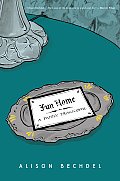
I’ve only read a couple graphic novels in my life. Maybe I’m choosing well, but I’ve found them to be much like any good novel, intriguing, engrossing, and imbued with emotions.
I loved Marjane Satrapi’s “Persepolis” series about Iran and life as an exile in France. Somehow the comics enhanced the story of her adolescent confusion and burgeoning sexuality. They also made the scenes of oppression in Iran easier to take.
I’ve just read Alison Bechdel’s new graphic memoir, Fun Home: A Family Tragicomic, and think it works even better than Persepolis. Bechdel tells intertwining stories of her father, her mother and herself living in a rural town in Pennsylvania, and how they lived parallel, yet separate, lives.
The focus is on her father, who is a closeted homosexual. He finds joy in turning the family’s run-down Federal style farm house into a Victorian showcase, a place almost too ornate to be comfortable. He teaches English and runs the family’s undertaker business. Alison calls the funeral home the “Fun House.”
Alison, who is a lesbian, is “Spartan to my father’s Athenian, modern to his Victorian, Butch to his Nelly, utilitarian to his aesthete.” She spends much of her life defining herself in opposition to her father, until, ironically, he conveys his homosexuality to her a few weeks before he dies. (It’s officially an accident – he is hit by a truck – but Alison suspects he committed suicide.)
Blechdel is trying to understand her father’s life. Was it wasted because he could not publicly acknowledge who he was? Was he gay or bisexual? Did he ruin his wife’s life? Why did he keep so many secrets? Throughout the graphic novel, Bechdel tries to uncover her father’s motives, and the book is as much about her search for understanding as it is about his story.
The book is also built around themes in literature, as Bechdel and her father are avid readers. Blechdel uses Ulysses, by James Joyce, and The Odyssey, by Homer, to explore themes of connection, loss, and journey.
I gave this book to my 14-year old daughter before I read it, naively thinking that a graphic novel would be appropriate for a young reader. It’s not. There are explicit scenes of coupling and the literary illusions were too sophisticated for her to grasp completely. But I would highly recommend it to others.
Bechdel explains her book to the Village Voice and to the Powell's blog.

4 comments:
As a former comic book geek, I've appreciated the flowering of the graphic novel form.
thanks for the update-
Armand
I've never read a graphic novel. But I was sort of perpelexed to find that the poetry section at a local book store was smaller than the graphic novels.
Not that I want to boycott the graphic novels over this, but it just seems wrong to me somehow.
wow- I've never been much of a poetry fan, so I know little about contemporary poetry, but it seems that the idea of popular poetry has been de-emphasized over the last few decades.
To my understanding, the worlds of academic poetry and poetry as art (or literary poetry) still exist, but they are small.
I recently read some articles about the resurgence of the poetry chapbook.
- Armand
I'm looking forward to reading her book.
BTW, Bechdel has an interesting blog where she is commenting on her conflicting feelings about getting a flood of national attention after being read by a smaller lesbian audience for twenty years.
Post a Comment